- Clone
- N2B2 (See other available formats)
- Regulatory Status
- RUO
- Other Names
- TNFSF10, TNF-related apoptosis inducing ligand, Apo-2 ligand, Apo-2L, CD253
- Isotype
- Rat IgG2a, κ
- Ave. Rating
- Submit a Review
- Product Citations
- publications
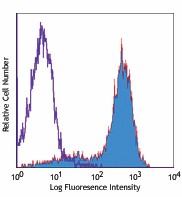
-

Mouse TRAIL transfected cells stained with biotinylated N2B2, followed by Sav-PE
| Cat # | Size | Price | Quantity Check Availability | Save | ||
|---|---|---|---|---|---|---|
| 109303 | 50 µg | $112 | ||||
CD253 is a 40 kD TNF superfamily member known as TRAIL, Apo-2 ligand, and Apo-2L. TRAIL is expressed on a variety of cells, including IL-2 and IL-15 activated NK cells and activated T cells. However, it is undetectable on resting T and B cells. TRAIL has been reported to induce apoptosis in tumor and transformed cell lines by a caspase-dependent process. The N2B2 antibody has been reported to be useful for flow cytometric staining and blocking NK cell cytotoxicity in vitro.
Product DetailsProduct Details
- Verified Reactivity
- Mouse
- Antibody Type
- Monoclonal
- Host Species
- Rat
- Immunogen
- Mouse TRAIL-transfected 2PK-3 cells
- Formulation
- Phosphate-buffered solution, pH 7.2, containing 0.09% sodium azide.
- Preparation
- The antibody was purified by affinity chromatography, and conjugated with biotin under optimal conditions.
- Concentration
- 0.5 mg/ml
- Storage & Handling
- The antibody solution should be stored undiluted between 2°C and 8°C. Do not freeze.
- Application
-
FC - Quality tested
- Recommended Usage
-
Each lot of this antibody is quality control tested by immunofluorescent staining with flow cytometric analysis. For flow cytometric staining, the suggested use of this reagent is ≤ 0.25 µg per 106 cells in 100 µl volume. It is recommended that the reagent be titrated for optimal performance for each application.
- Application Notes
-
Additional reported applications (for the relevant formats) include: in vitro blocking of NK cell cytotoxicity1,2. The LEAF™ purified antibody (Endotoxin <0.1 EU/µg, Azide-Free, 0.2 µm filtered) is recommended for functional assays (Cat. No. 109308).
-
Application References
(PubMed link indicates BioLegend citation) -
- Kayagaki N, et al. 1999. J. Immunol. 163:1906. (Block)
- Sato K, et al. 2005. J. Immunol. 174:4025. (Block)
- Joshi PS, et al. 2006. J. Leukocyte Biol. 80:1345.
- Herold S, et al. 2008. J. Exp. Med. 205:3065. PubMed
- Iannello A, et al. 2009. J. Virol. 83:5999. PubMed
- Komatsu M, et al. 2003. Blood 101:3991. (Block)
- Taieb J, et al. 2006. Nature Med. 12:214. (Block)
- Gonzaga R, et al. 2011. J. Immunol. 187:6235. PubMed.
- Product Citations
-
- RRID
-
AB_345271 (BioLegend Cat. No. 109303)
Antigen Details
- Structure
- TNF ligand superfamily member, approximately 40 kD
- Distribution
-
Widespread, highest expression in spleen, lung, prostate; NK, monocytes, neutrophils, activated T cells
- Function
- Induces apoptosis in tumorigenic and transformed cell lines, involved in T cell mediated cytotoxicity
- Ligand/Receptor
- TRAIL receptor DR5
- Cell Type
- Monocytes, Neutrophils, NK cells, T cells
- Biology Area
- Immunology
- Molecular Family
- CD Molecules
- Antigen References
-
1. Kayagaki N, et al. 1999. J. Immunol. 163:1906.
2. Wiley SR, et al. 1995. Immunity. 3:673.
3. Wu GS, et al. 1999. Cancer Res. 59:2770.
4. Mariani SM, et al. 1998. Eur. J. Immunol. 28:973. - Gene ID
- 22035 View all products for this Gene ID
- UniProt
- View information about CD253 on UniProt.org
Related FAQs
- How many biotin molecules are per antibody structure?
- We don't routinely measure the number of biotins with our antibody products but the number of biotin molecules range from 3-6 molecules per antibody.
Other Formats
View All CD253 Reagents Request Custom Conjugation| Description | Clone | Applications |
|---|---|---|
| Purified anti-mouse CD253 (TRAIL) | N2B2 | FC,Block |
| Biotin anti-mouse CD253 (TRAIL) | N2B2 | FC |
| PE anti-mouse CD253 (TRAIL) | N2B2 | FC |
| APC anti-mouse CD253 (TRAIL) | N2B2 | FC |
| PerCP/Cyanine5.5 anti-mouse CD253 (TRAIL) | N2B2 | FC |
| PE/Cyanine7 anti-mouse CD253 (TRAIL) | N2B2 | FC |
| Ultra-LEAF™ Purified anti-mouse CD253 (TRAIL) | N2B2 | FC,Block |
| TotalSeq™-A0925 anti-mouse CD253 (TRAIL) | N2B2 | PG |
| TotalSeq™-C0925 anti-mouse CD253 (TRAIL) | N2B2 | PG |
| TotalSeq™-B0925 anti-mouse CD253 (TRAIL) | N2B2 | PG |
Customers Also Purchased
Compare Data Across All Formats
This data display is provided for general comparisons between formats.
Your actual data may vary due to variations in samples, target cells, instruments and their settings, staining conditions, and other factors.
If you need assistance with selecting the best format contact our expert technical support team.
-
Purified anti-mouse CD253 (TRAIL)
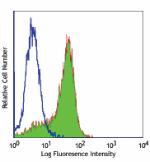
Mouse TRAIL transfected cells stained with purified N2B2, fo... -
Biotin anti-mouse CD253 (TRAIL)
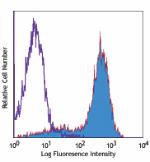
Mouse TRAIL transfected cells stained with biotinylated N2B2... -
PE anti-mouse CD253 (TRAIL)
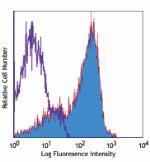
Mouse TRAIL transfected cells stained with N2B2 PE -
APC anti-mouse CD253 (TRAIL)
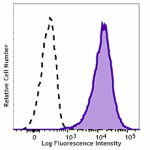
Mouse TRAIL transfected L5718Y cells were stained with CD253... -
PerCP/Cyanine5.5 anti-mouse CD253 (TRAIL)
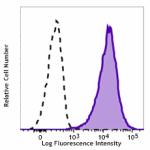
Mouse TRAIL transfected L5718Y cells were stained with CD253... -
PE/Cyanine7 anti-mouse CD253 (TRAIL)
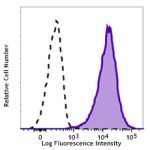
Mouse TRAIL transfected L5718Y cells were stained with CD253... -
Ultra-LEAF™ Purified anti-mouse CD253 (TRAIL)
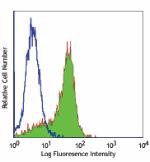
Mouse TRAIL transfected cells stained with LEAF™ purified N2... -
TotalSeq™-A0925 anti-mouse CD253 (TRAIL)
-
TotalSeq™-C0925 anti-mouse CD253 (TRAIL)
-
TotalSeq™-B0925 anti-mouse CD253 (TRAIL)
 Login/Register
Login/Register 







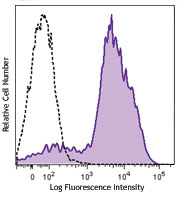
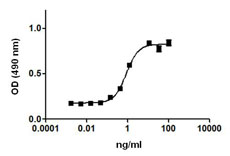
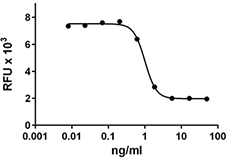
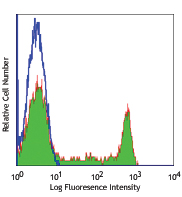



Follow Us